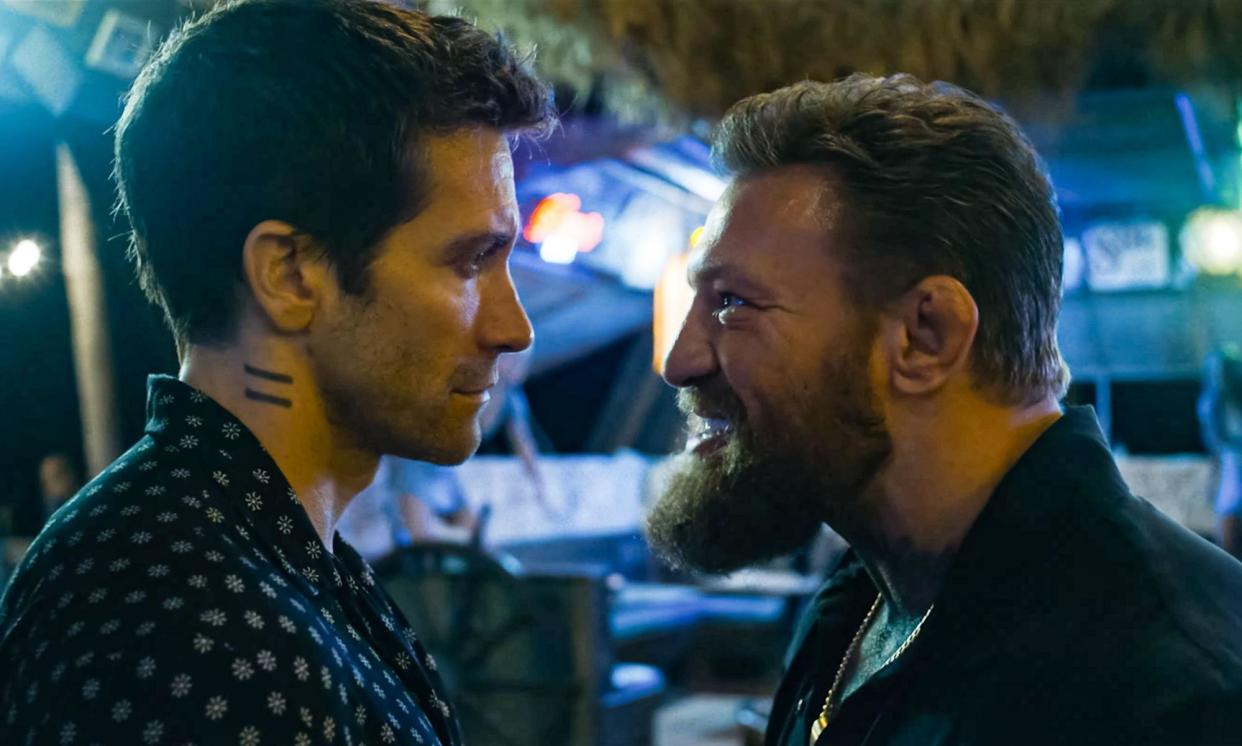Road House review – Conor McGregor almost steals riotous 80s remake

It would be easy to dismiss a new Road House – the shoes left by a gritty, sweaty Patrick Swayze in the pulpy 1989 action film are hard ones to fill; sequels and remakes tend to tip the fine balance of good-bad that defined so many films from that period into straight-up bad. Plus, the Road House remake from The Bourne Identity director Doug Liman is (controversially) bypassing theaters and headed straight to streaming via Amazon Prime Video – by now, given the deluge of disposable content, a dubious distinction for quality.
Related: Damsel review – Millie Bobby Brown goes Rambo in diverting Netflix adventure
The straight-to-streaming release plan, however intentional, is indeed a bummer, as Liman’s rowdy, campy remake both looks and sounds more expensive and textured than what we’ve come to expect from digital releases. This Ultimate Fighting Championship-inflected Road House, starring Jake Gyllenhaal as a brass-knuckled bouncer with a tortuous past, is meant for the big screen, as evidenced by the hoots and hollers at its SXSW premiere. Relocated from honky-tonk Missouri to the Florida Keys, the new Road House, written by Anthony Bagarozzi and Charles Mondry (who collaborated on the story with original screenwriter David Lee Henry), is an entertaining and visceral, if at times unwieldy, romp of scene-chewing trash talk and smackdowns.
Like his predecessor, Gyllenhaal’s Elwood Dalton is a dry and at times philosophical man with exceptional mixed martial arts skills, who flees a fight gone too far (in this case, actual UFC) for smaller, grimier pastures. We meet Dalton living out of his car in skeevy south Florida, scraping by with prize money won from scaring amateur fighters like Carter (Post Malone) out of the ring with just a flash of his professionally toned abs. Enter, with nearly indecipherable exposition, Frankie, a barkeep in the Keys played by Jessica Williams, her trademark sardonic wit almost distractingly reasonable for the south Florida mayhem around her. Faced with aimless depression or a few thousand a month to keep the peace at her family’s bar, Dalton heads to the Road House, a beachside dive that looks like a smaller, cheaper Margaritaville.
It’s a rough establishment. For reasons, the Road House attracts a disproportionate amount of shady characters with hair-trigger rages, and employs a disproportionately high number of good musicians to soundtrack nightly bar fights from behind a chain-link fence. The most destructive patrons are a motorcycle gang led by Dell (JD Pardo), whose 5 v 1 defeat by Dalton illustrates the film’s light superhero touch and gets Dalton embroiled with a cartoonishly villainous developer named Brandt (Billy Magnussen, ever reliable at cartoonish villainy).
There is plot – drugs, corrupt cops, hits, boats, a shirtless Gyllenhaal doing pull-ups, etc – that is generally difficult to follow and also not the point. True to form, the stakes barely make sense, even as they are ostensibly raised by money, death and kidnapping. Which is fine, though to its detriment, especially at a full two-hour runtime, Road House is not interested in backstory for Dalton (save his flashback-inducing crime) or its many underdeveloped supporting characters. Among them: flinty bartender Laura (BK Cannon), aspiring bouncers Billy (Lukas Gage) and Reef (Dominique Columbus), bookstore owner Stephen (Kevin Carroll) and his precocious daughter Charlie (Hannah Love Lanier) and, most egregiously, Dalton’s love interest Ellie (Daniela Melchior), a nurse with connections who manages to sneak one personal question past him in their too-brief courtship. (“You think we don’t have Google on this island?” stands in for the rest.) Intriguing details such as Ellie’s estranged family or Frankie’s lineage of Black business owners, a feat in the Jim Crow south, are briefly floated as character motivations – why are people staying in this town?! – but summarily buried in the brash and brawn.
Still, you come to the Road House for a good time and some knuckle-cracking fights, and on that front, this film delivers, owing to some truly impressive stunt work, a fully convincing performance from Gyllenhaal in Southpaw form, and a crackling screen debut from UFC champ-cum-entertainer Conor McGregor. The Road House bar may be pretty small-time – in fact, some of the film’s enjoyment derives from just how small-town and petty this world is – but the fight sequences are operating on a big, bold, reality-stretching canvas. Big as in crocodile fights big, full cast bar – brawl big, knockout death match between Dalton and McGregor’s cocky (and occasionally bare-assed) hitman big. It’s primal, bruising, ludicrous and very fun.
McGregor, it turns out, is a natural at playing a devilishly flamboyant villain, at times stealing the show from a more grounded Gyllenhaal. Liman keeps the camp in check, though, with a focus on the visceral – broken bones and bloody noses, concussed POV, the sickening crack of a fist connecting with skull. If you have a fear of brain damage or your teeth getting knocked out like piano keys, tread carefully. I have never and, after this movie, will never watch UFC, which I mean as a compliment to Liman’s balance of flair and real, gut-twist fighting. That balance, of serious and faux-serious, is one the new Road House doesn’t always strike, but it gives what it needs to: movie-star charisma and a consistently good time.
Road House is available on Amazon on 22 March

 Yahoo Movies
Yahoo Movies 
